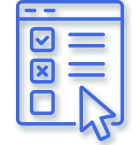What does an Addiction Counselor in Iowa do? What is Their Job Role?
Substance abuse includes alcohol dependency, illegal drug use, and illegal use of legal or prescription drugs. Substance abuse is a major problem confronting the US and many other advanced societies around the world. Drugs and alcohol dependency are difficult issues. Because they are powerful addictions, they have a tremendous cost in terms of family disruptions, serious injuries, and deaths.
Counseling is a primary tool in the arsenal against addiction. In the US, treatment and drug education make the basis for reducing drug addiction and alcohol dependency. Counseling takes place in inpatient settings, on an outpatient basis, and in correctional institutions. Iowa substance abuse counselors play a vital role in human services recovery from addiction and maintenance of sobriety.
Compare Popular Online Substance Abuse Counseling Programs
Overview
Iowa statutes set standards for organizations that provide substance abuse counseling and treatment for prison and jail populations and the public at large. The state does not license counselors; the code refers to an outside public body to perform certifications. Under the current arrangement, the Iowa Board of Certification provides widely accepted certification and credentials for Iowa substance abuse counselors. Some rules apply to all applicants and all levels of credential certification. All applicants must submit to a criminal background check, and applications above the entry level must include a supervisor evaluation. The supervisor evaluations are valid if issued by a supervisor previously approved by the ICB.
Communications play an important role in the effectiveness of a Substance Abuse Counselor. He or she must exchange ideas effectively with a variety of relationships and audiences. Counseling involves working closely with mentors, team consultants, patients, and families. The counselor must also play a role in drug education and prevention. He or she must communicate with the public.
Iowa Licensing & Certifications for Associates & Independent Counselors

Iowa issues four primary substance abuse counselor credentials. They use the (1) Temporary Certified Alcohol and Drug Counselor, the (2) Certified Alcohol and Drug Counselor, the (3) International Alcohol and Drug Counselor, and (4) the International Advanced Alcohol and Drug Counselor.
(tCADC) temporary Alcohol and Drug Counselor certification
tCADC is the temporary Alcohol and Drug Counselor certification. It is an entry-level counselor credential aimed at improving the work experience level of an applicant for the CADC. The license is not renewable, and it has no reciprocity or recognition in other states. The advantage of eligibility without experience and no prior counselor education and supervision permits nearly anyone to apply and try for a credential. This easy entry position is ideal for recovering addicts that wish to contribute their voices of experience to the fight against drug abuse. The applicant must pass the ADC exam.
(CADC) Certified Alcohol and Drug Counselor credential
The drug counselor CADC is the Alcohol and Drug Counselor credential. It is the basic classification for counselors in Iowa. The CADC is not a reciprocal certification, and other states do not have to recognize it as a credential.
International Alcohol and Drug Counselor IAADC credential
The International Alcohol and Drug Counselor IAADC credential. It is a reciprocal certification within the UC&RC system. Applicants must have a minimum of 300 clock hours doing tasks related to Alcohol and Drug Counseling domains. Applicants with associate’s, bachelor ’s, or master’s degree can reduce the work experience requirement downward from the standard 6,000-hour minimum.
International Advanced Alcohol and Drug Counselor IAADC
The International Alcohol and Drug Counselor IAADC credential requires a master’s degree or other advanced degrees in a related behavioral science field of study. The applicant must have earned 180 clock hours of drug or alcohol-specific education. The knowledge must be current with at least 30 clock hours earned in the two-year period before the exam. The training domains include the eight requirements for the drug counselor IADC [ (1) clinical evaluation, (2) treatment plans, (3) referral procedures, (4) continuum of care coordination, (5) counseling, (6) drug and alcohol education, (7) case documentation, and (8) professional ethics and responsibilities], and add (9) clinical supervision (10) design analysis, utilization, and research.
Education Requirements
tCADC education requirements
tCADC or Temporary Alcohol and Drug Counselor has no education level required for this entry-level temporary certification. The applicant must have 45 clock hours of study in counseling theories and techniques; 45 clock hours of Alcohol and Drug education, six (6) clock hours of focus on working with special parts of the population, six (6) clock hours of ethics training, and three (3) clock hours of racial and ethnic sensitivity training.
CADC education requirements
The drug counselor CADC or Certified Alcohol and Drug Counselor requires a high school diploma or GED. The CADC is not a reciprocal credential, and other states do not recognize the Iowa drug counselor CADC as a valid credential. Just as with the tCADC, the applicant must have 45 clock hours counseling theories and techniques; 45 clock hours of alcohol and drug education, six (6) clock hours of focus on working with special parts of the population, six clock hours of ethics training, and three clock hours of racial and ethnic sensitivity training. Applicants can qualify for Alcohol and Drug Counselor certification through formal education on the education track. The education track requires 1000 clock hours of related work experience rather than 3000 for the experience track.
Drug counselor IADC education requirements
Drug counselor IADC applicants must have a minimum of 270 clock hours consisting of 90 clock hours counseling theories and techniques; 90 clock hours of alcohol and drug education; three (3) clock hours of focus on working with special parts of the population; and six (6) clock hours of ethics training. Applicants must prove a minimum of 300 directly-supervised clock hours of work experience performing or related to the eight ADC domains of clinical evaluation, treatment plans, referral procedures, the continuum of care coordination, counseling, drug and alcohol education, case documentation, criminal justice, and professional ethics and responsibilities.
IAADC education requirements
IAADC or International Advanced Alcohol and Drug Counselor certification is a reciprocal credential. The applicant must have a master’s degree in counseling or a related field. Applicants must prove 180 clock hours of Alcohol and Drug education, six (6) clock hours in ethics and professional responsibility, and three (3) clock hours of course study or training for working with racial and ethnic group members and families.
PRS education requirements
PRS or Peer Recovery Specialist offered by the Iowa Board of Certification provides an opportunity for applicants in recovery to participate as support staff to counselors. It is a reciprocal credential that requires 500 clock hours of work experience. Volunteer work qualifies as work experience. One must show 10 clock hours of directly supervised work in Alcohol and Drug counseling support. The education component consists of an approved 40-hour course of Alcohol and Drug education and six (6) clock hours of ethics.
Find Your Online Addiction Counseling Program
While this is not a counseling credential, it is a promising and reciprocal certification. The purpose of the credential is to involve recovering addicts in the process of prevention and treatment. Recovering addicts may bring a unique point of view and a voice that patients can find convincing and easily understood.
CACREP Accredited Online Certification

Two types of accreditation are recognized in the United States; institutional and specialized. Institutional accreditation takes the entire institution into account while the specialized focus on professional preparation programs. The Council for Accreditation of Counseling and Related Educational Programs (CACREP) is a specialized accreditation that focuses on master’s degree and doctoral degree programs in counseling at colleges and universities worldwide. Only already-accredited institutions are eligible for CACREP review. The review for accreditation will center on programs offering graduate degrees in counseling.
Choosing a CACREP-accredited program ensures that the program meets the highest of quality standards. Many counseling specialties are accredited bythe CACREP, including addiction counseling. Accredited addiction counseling programs prepare individuals to work with those affected by addictive behavior and their families. Addictive behaviors include alcohol, drugs, food, gambling, sex, and anything else that negatively affects your personal or work life by creating addiction behaviors.
CACREP-accredited programs will focus on treatment models and the phases of addiction including prevention, recovery, and relapse prevention. These 60-semester hour programs will include the application of interventions. When students choose a CACREP-accredited program they can be confident that:
- the program meets or exceeds national standards
- the program will focus on professional counseling rather than psychology oreducation
- the program has an excellent reputation
- CACREP graduates statistically receive higher scores on the National Counselor Examination for Licensure and Certification (NCE).
- the requirements for licensure will be met.
Board of Behavioral Science
The Iowa Board of Behavioral Science consists of an Executive of the Iowa Department of Public Health, aided by a Secretary of the Iowa Bureau of Professional Licensure. The Board evaluates applicant qualifications for clinical mental health counseling and Marital and Family Therapist licenses. It is also the responsibility of the Board of Behavioral Science to investigate complaints in an effort to protect the public from unprofessional conduct in the industry. The Board offers licensing, renewals, and reactivation.
- Mental Health Counselors
- Associate Counselors of Mental Health
- Chemical Dependency Counselors
- Marriage and Family Therapists
- Associate Marriage and Family Therapists
Address
Lucas State Office Building, 5th Floor
321 E. 12th Street
Des Moines, IA 50319
Phone
(515) 281-7689
Website Address
https://idph.iowa.gov/Licensure/Iowa-Board-of-Behavioral-Science
Licensure:
- Licensed Mental Health Counselor (LMHC)
Counselor Testing & Examination Process

Individuals can download application forms from the Iowa Board of Certification website. The Board processes applications and provides testing dates, instructions, and test prep materials for approved applications. The Board offers upgrade processes for tCADC to CADC and from CADC to ICADC.
Iowa uses a state-specific Alcohol and Drug Counseling exam and the IC & RC exam or reciprocal system. Applicants must request an application and file the required supporting documents. Iowa requires documentation for work experience and proof of academic work through transcripts or other official records.
Iowa requires strict documentation of work experience through letters and business records; the Board requires official documents or transcripts to prove educational attainment. Applicants must pay a fee to cover the test, review of the application, grading, and processing the credential.
Clinical Supervision Explained
The idea of older more experienced members of a profession teaching and encouraging younger, less experienced members is not a new idea. It is relatively new to the human services substance abuse counseling profession, and it holds promise to improve quality and consistency of services and raise the level of patient outcomes. Clinical supervision is the primary method for improving the quality of counseling-based treatment and care.
Counselor education and supervision develops professionalism, delivers clear patterns of ethical conduct, and improves patient care. It is a tool for counselors to acquire knowledge and gain confidence in critical thinking and their problem-solving abilities. A clinical setting is an instance of interaction between a counselor and a patient or family. Human services clinical counselor education and supervision is a training and professional development process. The goal of supervision is to ensure high-quality care to patients.
Clinical supervisors use observation to assess the counselor’s performance. The clinical supervisor must create a positive working atmosphere in which both can express freely. The observation yields feedback that provides a basis for expanding skills, gaining new skills and increasing knowledge. Counselors get encouragement to further study human services to improve knowledge and depth of understanding. The goal is a continuous movement of professional growth and self-assessment.
Renewal and Continuing Education
The Iowa Certification Board sets the terms of the certification and the procedure, fees, and times for recertification. The Iowa Board of Certification authorizes two-year terms for the drug counselor CADC, drug counselor IADC, and IAADC certifications. The Board requires 40 clock hours of continuing education within the two-year term of the certification.
Certified substance abuse counselors must perform 40 clock hours of approved continuing education study during the two-year certification term. The IBC posts lists of approved courses for CEU and the value of each in terms of clock hours creditable to the CEU requirement. A counselor can qualify for recertification if the mix of CEU credits includes studies as described below.
- Perform six (6) clock hours in alcohol and drug-specific courses.
- Perform six (6) clock hours in special populations specific studies.
- Complete three (3) clock hours in Ethics coursework.
Potential Counselor Career Path Options
- Addiction Counselor
- Alcohol and Drug Addiction Counselor
- Behavioral Health Specialist
- Certified Addiction Drug and Alcohol Counselor
- Chemical Dependency Counselor
- Mental Health Counselor
- School Counselor
- Substance Abuse Counselor
Associations & Organizations

The Iowa Board of Certification is the accepted source of authority for certification and substance abuse counseling credentials. They provide entry-level through expert credentials, and credential recognized by IC&R chapters outside of Iowa.
Iowa Behavioral Health Association is an advocacy organization that promotes policies that reduce addiction and substance abuse. It consists of leaders for substance abuse and treatment programs. The organization promotes treatment, detection, and education activities throughout the state of Iowa.
